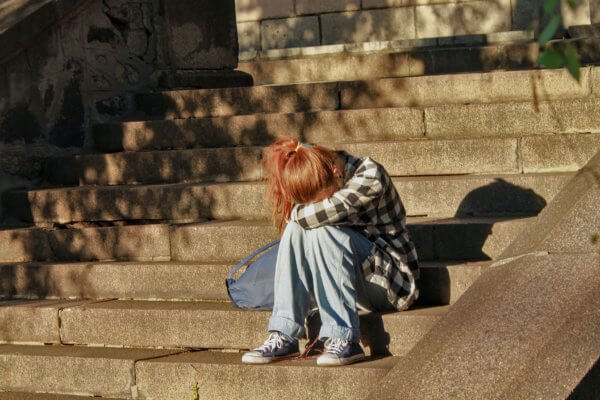Dealing with our Parenting Triggers
What is a trigger?
Trigger. There’s a difference between being uncomfortable and being triggered. Some people say triggers have to be very traumatic, like PTSD. I’m going to use trigger in a broader sense here. We talk about being triggered by content, by media, by each other, by our children. I really appreciate this definition from Laura Markham, a clinical psychologist and parenting coach, author of Peaceful Parents, Happy Kids. She says, “a trigger is anything you experience in the present moment that activates a feeling from the past, so we act in a way that’s not necessarily keeping with the present.”
All of us do this. People, things, and behaviors in the present moment activate emotions from the past, and then we’re moving from that place. We’re not dealing with what’s in front of us right now; we’re acting from our hurt feelings from the past.
Many of us come into parenting with a huge suitcase full of patterns, beliefs, and experiences from how we were parented. Even when we declare that, “we’re doing it differently,” all of that baggage is right there, waiting for an opportunity to leap out.
Getting to Know your Triggers
Toddlers to teenagers – they all can trigger us. I remember the first time I really lost it and realized, “Oh. It’s going to require more than just deciding “I’m going to be a different kind of mom.” I think my daughter was 3, and I was helping her clean her room. She was dawdling, and I just started to feel overwhelmed by all of the crap and the clutter. It was a full-body experience, tingling and heat from my feet up to my face. It was like a beckoning – “just give it to her! Just let her have it! Explode!” It was such an interesting experience because on one hand I became very aware of what lives inside of me, what I am capable of, and the choices I had, but on the other hand, that was the beginning of developing some really strong compassion for my mom’s experience and considering how far back in the line of mothers raising daughters that this intense, overwhelming, explosive behavior came from.
There are plenty of you out there who have raised kids and helped them clean their rooms without being triggered by it, but in my experiences that I have lived through, clutter and tidiness was a catalyst for some really dysregulated, explosive behavior that I experienced from a parent. That lives inside of me.

Triggers are different things for different people. For example, when I think about teenagers who might be experimenting with alcohol, it’s really interesting to talk to parents who have no history of using alcohol themselves and their perspective versus talking to parents who perhaps had some overkill alcohol use as youth and their perspective on their teen drinking. It’s fascinating to me how our perspective is developed and colored through the individual experiences that we have. We all have different triggers because we all have different histories.
One reason why teen’s behavior can be so triggering because we have self-respect. We know we deserve to be treated with dignity and respect, and sometimes our kids don’t treat us that way. Their behavior is triggering because we have a “haven’t I taught them better than this?” mindset. We self-doubt. We can be so dismissive of their experiences.
Being curious and getting to know who we are is key. Both noticing the moments when we are feeling that sense of overwhelm, fear, anger, or wanting to escape and reflecting on those moments after the fact. “I got really upset just then. What in my history was pinged when my child just gave me that attitude?” Or “What is it about my child struggling in school that is triggering something from my history that’s so uncomfortable?” The only way we can go there is by being willing to reflect and recognize.
The other piece of this is that when our triggers get the best of us, when we do flip our lid and say something we wish we hadn’t, what does it look like to go back to our kids and to make amends?
I have a great podcast episode with Kristen Huvious around making amends that was really powerful.
So much of the angst that we feel raising middle schoolers and high schoolers is because we are not stepping into a human-to-human relationship. We really try to hold this dynamic where “we’re the adult, we’re the rational ones; you’re the child and you don’t really get it.” It creates a barrier. If we can chip away at that and be authentic and real, then we can move towards solutions that are useful. That’s what makes our kids feel seen, heard, understood and validated.
Navigating our Triggers
The first thing we can do to get better with our triggers is to explore the experience. It’s easy to blame our kids for triggering us, but I want to invite you to let go of blame and find neutral.
We have to let go of tension physically and emotionally. For me, physically, it’s heat and tingles from my feet to my face. My jaw locks, my shoulders tense, and I just feel tight. The emotional part is harder to tease apart, but for me, it’s usually a feeling of rejection showing up. I have a whole history around rejection, and it makes sense to me that that’s where I go. It’s powerful to get intimate with the experience and start connecting your dots. You begin to realize, “Oh, my kids aren’t rejecting me when they don’t do chores. They aren’t rejecting me when they want to watch Netflix in their room.” When I respond to things like that with my baggage around rejection, I can really do a number on our relationship.
Pay attention to the deeper experience that you’re having. Try to notice your own patterns. I know that for me, even though I don’t have a meticulously clean home, if things start to go sideways and there’s a lot of clutter around, I’m going to have a really hard time. I know that’s one of my patterns. These patterns can be unhelpful, but we can change them!
The place where we have the power to change our patterns is in our response. That’s why we need to get more intimate and familiar with our own triggers and self-regulation. We can begin to notice what’s happening:
My teen gave me serious attitude.
I became triggered.
I feel the emotion and tension.
Pause: THIS IS THE CHANGE POINT. Do I say things that I really don’t want to? Or, do I work on self-regulation and calming down so I can handle this in a different way?

You have to be willing to try something new. You have to be willing to choose differently, over and over again. Right now, you already have a pattern! Your patterns might be so well-worn that you don’t even think about them. Next time your teenager has an attitude with you, then get yourself together and try responding in a new way! It is challenging. At first while you’re trying to identify your patterns, you’ll just notice them in retrospect, but after a while, you’ll start to see the space, before you respond, where you can make a change.
Who do you want to be for your kids?
How do you want to show up for your children?
Who do you want to be?
Are you willing to show up that way no matter what? Even when they’re mouthing off? Even when they’re angry about your boundaries? Even when they’re grumpy at the dinner table? Are you willing to be the parent you want to be even when your kids aren’t being their best? That’s when it matters the most!
Bring them in
So, one layer is getting to know yourself, your history, & your triggers and choosing to respond differently. That’s your work. The other piece is bringing them in and having conversations with them about their experiences. We have to connect human-to-human. When we open up, we have to start with compassion and curiosity. We have to let go of preconceived notions and start from neutral.
If you’re really struggling with your teenager being disrespectful to you, talk to them about it. Ask them “what’s going on? I’m here for you. I love you. Let’s try to create a relationship where we can be honest and not hurtful to each other.” Yes, there may be some resistance there. Maybe you have to start by making amends. “I’ve really been getting on your case about your attitude lately. I recognize that that’s not useful. I’m really sorry about that. I’d like to try something different.” Use your words and authentically connect with your kids so they can open up. This might take a few tries, but this is really important.
The pre-teen and teen years truly are tough.
There’s craziness happening with their development. They’re angsty and emotional. The intensity of what they’re feeling is bigger than we can really understand or remember. They are in this weird limbo- they’re not kids, but they’re not adults. They really want to pull away from us (which is appropriate), yet we’re still guardians who hold the rules over their head. Of course that’s going to be an intense relationship!
Keep the faith
Decide who you want to be for your kids, and as they pull and push and do all the things, keep showing up. Yeah, I can get triggered by teen angst. When my daughter was really struggling a few years ago, I had a friend tell me, “14, 15 are the toughest years. You feel like you’re losing ‘em. 16, 17, 18 – eventually they come back around.” I remember hearing that and thinking, “That’s not useful right now while things are shit. I’m scared. I don’t know what to do.” But as you know, we’ve worked through a lot of stuff, both of us, and now I adore spending time with my daughter. I love hanging out with my teen daughter! She is thoughtful, deep, humble, open, and someone who can reflect honestly on her own experiences. 3 years ago, I could not have seen our relationship looking like this. They will come back to you.
Explore who it is you want to be. How committed are you to being that person? Do the work. You’ll have so many opportunities to veer off course, and I just encourage you to stay the course.
They love you and they need you, even if they aren’t showing you right now.
Listen on the podcast, episode 247 .





Comments